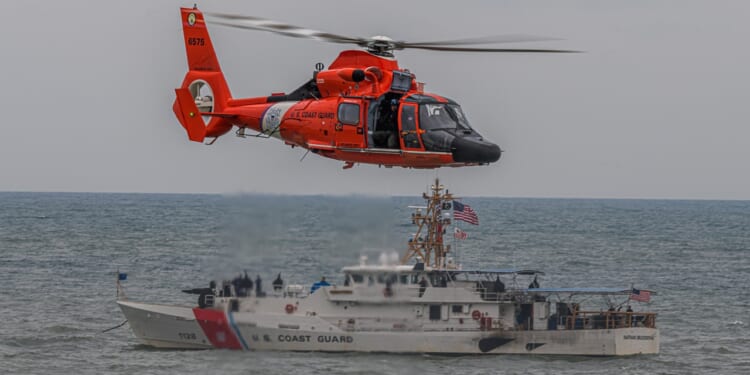Despite the Coast Guard’s everyday importance to maintaining America’s territorial integrity, and despite its increasing importance abroad, the service remains chronically underfunded.
The military force of a sovereign state has one primary purpose, nearly universal to all the world’s states: to maintain that nation’s territorial integrity. For the United States, that primary purpose is often obscured, thanks to US foreign policy, which favors intervention around the world and requires an expeditionary force consisting of a robust Army, Navy, and Air Force. But the one military branch most fully calibrated towards maintaining American territorial integrity, the military’s most important goal, is often viewed as an afterthought, a quasi-branch of the armed services. This, of course, is the United States Coast Guard.
Quiet, and relatively modest with respect to size and budget, the Coast Guard is almost exclusively designed to protect America’s shores—and maintain the nation’s core territorial integrity.
What Is “Territorial Integrity?”
Territorial integrity isn’t an abstract mission. It’s vital and real. It means keeping America’s vast maritime borders—95,000 miles of shoreline and 4.5 million square miles of exclusive economic zone—secure from violation, exploitation, and encroachment. And while the Navy is projecting power outward, on distant shores, the Coast Guard is defending inward, serving as the buffer between domestic security and external threat.
The Coast Guard is unique among the armed services for its dual role as both a military service branch and a quasi-law enforcement agency. The dual identity allows the Coast Guard to perform a wide variety of roles: interdicting smuggling, enforcing fishing rights, and monitoring foreign vessels, in a way that the US Navy (which is solely focused on warfighting and does not have law-enforcement credentials) cannot.
Much of the Coast Guard’s mission is executed close to home, where cutters and patrol aircraft serve as a thin line against transitional criminal organizations who test the US maritime border every day. Drug seizures and migrant interdictions are not simply law-enforcement statistics—as they are often framed—but in a broader sense are exercises in territorial control. And while American citizens seem prone to forget, keeping the border intact is a defining feature of any state.
The Coast Guard Has a Presence Abroad, Too
But the Coast Guard serves a geopolitical purpose, too. It is typically America’s only persistent presence in the Arctic—believed to be a near-future hotspot of strategic competition. Indeed, as the ice melts and new sea lanes appear, the Arctic promises to become a venue of great power competition. Emerging energy and mineral deposits, as well as the sea lanes themselves, have already drawn Russia and China deeper into the Arctic. The Coast Guard, which controls America’s icebreaker fleet, is the United States’ lone persistent presence in the region.
The Coast Guard also often operates in gray zones, where rival powers test the limits of their relationship with the United States. In the South China Sea, for example, where Chinese forces have become more assertive, the US has increasingly deployed the Coast Guard. The logic is simple: deploying a heavily armed Navy destroyer poses an escalation risk with Beijing, but a Coast Guard cutter can hit the sweet spot, signaling resolve without inviting war.
The Coast Guard Must Be Better Funded
Despite the Coast Guard’s everyday importance to maintaining America’s territorial integrity, and despite its increasing importance abroad, the service remains chronically underfunded. Even as the US defense budget balloons towards one trillion dollars annually, the Coast Guard fleet is aging; its icebreaker fleet is puny, and personnel hiring and retention is difficult to sustain.
The Coast Guard’s relatively limited share of the budget is a reflection of how under-appreciated the Coast Guard is—both in the eyes of the public and in the eyes of US war planners who persistently set their sights further abroad.
About the Author: Harrison Kass
Harrison Kass is a senior defense and national security writer at The National Interest. Kass is an attorney and former political candidate who joined the US Air Force as a pilot trainee before being medically discharged. He focuses on military strategy, aerospace, and global security affairs. He holds a JD from the University of Oregon and a master’s in Global Journalism and International Relations from NYU.
Image: Shutterstock / Greg Meland.
















